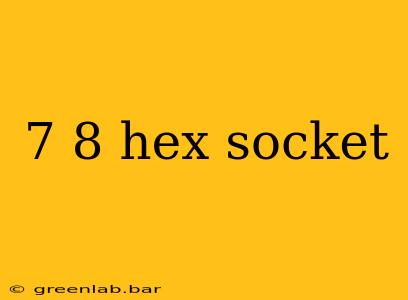Finding the right socket for your job is crucial, especially when dealing with larger fasteners. A 7/8" hex socket is a common size used in various applications, but understanding its nuances is key to selecting the appropriate tool for the task. This comprehensive guide will delve into the specifics of 7/8" hex sockets, covering their applications, materials, drive types, and how to choose the best one for your needs.
Understanding 7/8" Hex Sockets: Sizes and Variations
The "7/8"" refers to the size of the hex (six-sided) opening within the socket, designed to perfectly fit a 7/8" hex bolt head. While this seems straightforward, variations exist that require careful consideration:
Drive Size: The Unsung Hero
The drive size is the square or other shape at the end of the socket, designed to fit onto a ratchet, wrench, or impact driver. Common drive sizes for 7/8" hex sockets include:
- ½-inch drive: Suitable for general-purpose use and most common for hand tools. Offers a good balance of torque and maneuverability.
- ¾-inch drive: Ideal for high-torque applications requiring greater power, often used with impact wrenches for larger bolts.
- 1-inch drive: Less common for 7/8" hex sockets, but found in specialized heavy-duty situations needing extremely high torque.
Material Matters: Strength and Durability
The material of the socket significantly impacts its durability and lifespan. Expect to find 7/8" hex sockets made of:
- Chrome vanadium steel (Cr-V): A popular choice offering a good balance of strength, durability, and affordability. Provides excellent resistance to wear and tear.
- Chrome molybdenum steel (Cr-Mo): A higher-grade steel alloy offering superior strength and toughness, particularly important for impact applications. More expensive but significantly more durable.
Applications of a 7/8" Hex Socket
The 7/8" hex socket finds its place in a surprisingly diverse range of applications:
Automotive Repair and Maintenance:
- Wheel lug nuts: On many larger vehicles, wheel lug nuts utilize 7/8" hex heads.
- Suspension components: Various suspension parts, such as bolts securing control arms or shock absorbers, may use this size.
- Engine components: Some engine bolts and fasteners, particularly on larger engines or trucks, might require a 7/8" hex socket.
Industrial and Manufacturing:
- Heavy machinery maintenance: 7/8" hex bolts are commonly used in the construction and operation of heavy machinery, requiring robust sockets.
- Structural fastening: In various construction or fabrication projects, this size bolt is often employed for strong, secure connections.
Other Applications:
Beyond automotive and industrial uses, a 7/8" hex socket can find utility in numerous other areas, including agricultural equipment repair, home construction, and more.
Choosing the Right 7/8" Hex Socket: Factors to Consider
When purchasing a 7/8" hex socket, carefully weigh the following:
- Drive size: Select the drive size compatible with your ratchet, wrench, or impact driver.
- Material: Cr-V is suitable for general use; Cr-Mo is preferred for high-impact, high-torque situations.
- Socket type: Deep sockets offer access to recessed bolts, while standard sockets work for surface-mounted ones.
- Brand reputation: Reputable brands generally produce higher-quality tools with better durability.
Investing in a high-quality 7/8" hex socket is a worthwhile investment for anyone working with larger fasteners, ensuring reliable performance and preventing potential damage to bolts or equipment. Remember to always choose the right socket for the job and exercise appropriate safety precautions when using tools.

